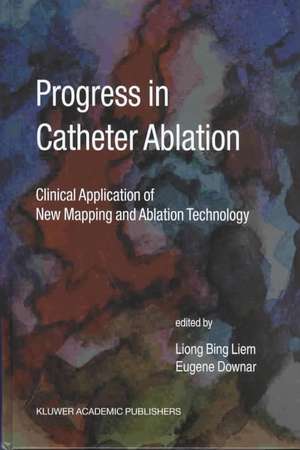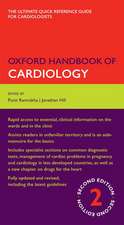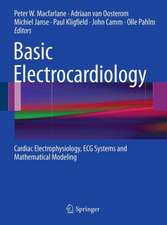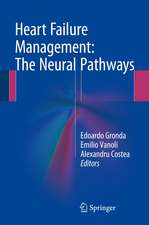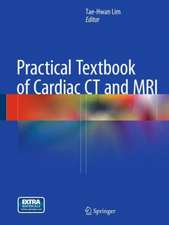Progress in Catheter Ablation: Clinical Application of New Mapping and Ablation Technology: Developments in Cardiovascular Medicine, cartea 241
Editat de Liong Bing Liem, Eugene Downaren Limba Engleză Hardback – 30 iun 2002
| Toate formatele și edițiile | Preț | Express |
|---|---|---|
| Paperback (1) | 1327.12 lei 38-44 zile | |
| SPRINGER NETHERLANDS – 14 mar 2012 | 1327.12 lei 38-44 zile | |
| Hardback (1) | 1436.77 lei 6-8 săpt. | |
| SPRINGER NETHERLANDS – 30 iun 2002 | 1436.77 lei 6-8 săpt. |
Din seria Developments in Cardiovascular Medicine
- 5%
 Preț: 1484.50 lei
Preț: 1484.50 lei - 5%
 Preț: 375.17 lei
Preț: 375.17 lei - 5%
 Preț: 354.10 lei
Preț: 354.10 lei - 5%
 Preț: 1419.03 lei
Preț: 1419.03 lei - 5%
 Preț: 376.43 lei
Preț: 376.43 lei - 5%
 Preț: 1098.27 lei
Preț: 1098.27 lei - 5%
 Preț: 1438.38 lei
Preț: 1438.38 lei - 5%
 Preț: 376.78 lei
Preț: 376.78 lei - 5%
 Preț: 368.37 lei
Preț: 368.37 lei - 5%
 Preț: 380.25 lei
Preț: 380.25 lei - 5%
 Preț: 2117.58 lei
Preț: 2117.58 lei - 5%
 Preț: 367.28 lei
Preț: 367.28 lei - 5%
 Preț: 366.56 lei
Preț: 366.56 lei - 5%
 Preț: 371.10 lei
Preț: 371.10 lei - 5%
 Preț: 370.94 lei
Preț: 370.94 lei - 5%
 Preț: 783.18 lei
Preț: 783.18 lei - 5%
 Preț: 713.18 lei
Preț: 713.18 lei - 5%
 Preț: 1098.27 lei
Preț: 1098.27 lei - 5%
 Preț: 375.49 lei
Preț: 375.49 lei - 5%
 Preț: 373.47 lei
Preț: 373.47 lei - 5%
 Preț: 723.93 lei
Preț: 723.93 lei - 5%
 Preț: 1104.13 lei
Preț: 1104.13 lei - 5%
 Preț: 2117.20 lei
Preț: 2117.20 lei - 5%
 Preț: 716.09 lei
Preț: 716.09 lei - 5%
 Preț: 372.03 lei
Preț: 372.03 lei - 5%
 Preț: 722.33 lei
Preț: 722.33 lei - 5%
 Preț: 660.07 lei
Preț: 660.07 lei - 5%
 Preț: 375.34 lei
Preț: 375.34 lei - 5%
 Preț: 1423.22 lei
Preț: 1423.22 lei - 5%
 Preț: 715.35 lei
Preț: 715.35 lei - 5%
 Preț: 790.69 lei
Preț: 790.69 lei - 5%
 Preț: 720.68 lei
Preț: 720.68 lei - 5%
 Preț: 3185.49 lei
Preț: 3185.49 lei - 5%
 Preț: 1418.27 lei
Preț: 1418.27 lei - 5%
 Preț: 784.64 lei
Preț: 784.64 lei - 5%
 Preț: 714.63 lei
Preț: 714.63 lei - 5%
 Preț: 370.74 lei
Preț: 370.74 lei - 5%
 Preț: 376.22 lei
Preț: 376.22 lei - 5%
 Preț: 660.85 lei
Preț: 660.85 lei - 5%
 Preț: 368.37 lei
Preț: 368.37 lei
Preț: 1436.77 lei
Preț vechi: 1512.39 lei
-5% Nou
Puncte Express: 2155
Preț estimativ în valută:
274.93€ • 287.77$ • 228.83£
274.93€ • 287.77$ • 228.83£
Carte tipărită la comandă
Livrare economică 31 martie-14 aprilie
Preluare comenzi: 021 569.72.76
Specificații
ISBN-13: 9781402001475
ISBN-10: 1402001479
Pagini: 590
Ilustrații: XVII, 590 p.
Dimensiuni: 160 x 240 x 37 mm
Greutate: 1.09 kg
Ediția:2002
Editura: SPRINGER NETHERLANDS
Colecția Springer
Seria Developments in Cardiovascular Medicine
Locul publicării:Dordrecht, Netherlands
ISBN-10: 1402001479
Pagini: 590
Ilustrații: XVII, 590 p.
Dimensiuni: 160 x 240 x 37 mm
Greutate: 1.09 kg
Ediția:2002
Editura: SPRINGER NETHERLANDS
Colecția Springer
Seria Developments in Cardiovascular Medicine
Locul publicării:Dordrecht, Netherlands
Public țintă
ResearchCuprins
I. Challenges in Catheter Ablation.- 1 The Arrhythmogenic Substrate in Ischemic and Non-Ischemic Cardiomyopathies. Structural and Functional Basis of Ventricular Arrhythmias.- 2 Anatomy and Electrophysiology of the AV Junction and Coronary Sinus.- 3 Anatomy of the Tricuspid Cavo Isthmus.- 4 Arrhythmias Following Repair of Congenital Heart Disease. Background and Scope of the Problem.- 5 Catheter Mapping and Ablation Technology. Limitations of Conventional Methods and Challenges of Newer Technology.- II. Newer Mapping Techniques.- 6 Utility of Orthogonal Electrodes in Radiofrequency Ablation. Discriminate Near-Field Sensing.- 7 Mapping Techniques in Patients with Paroxysmal Atrial Fibrillation Originating from the Pulmonary Vein.- 8 Pulmonary Venous Angiography.- 9 Ultrasonic Guidance for Radiofrequency Ablation.- 10 Mapping Using the LocaLisa System.- 11 Electroanatomical Mapping Using the CARTO® System. Technical Concepts, Validation, and Basic Application.- 12 Three Dimensional Reconstruction (CARTO®) in Patients with Congenital Heart Disease.- 13 Endocardial Mapping Using Real Time Three Dimensional Ultrasound-Ranging Tracking System. Results of In-Vitro, In-Vivo, and Clinical Studies.- 14 Endocardial Contact Mapping Using Multipolar Basket Electrode Catheters.- 15 Endocardial Global Noncontact Mapping (EnSiteTM).- 16 Endocardial Noncontact Mapping in Pediatric and Grown Up Congenital Heart Arrhythmias.- III. Newer Ablation Approaches and Modalities.- 17 The Advantages and Disadvantages of Creating Large Radiofrequency Ablation Lesions.- 18 New Concepts in Radiofrequency Energy Delivery and Coagulum Reduction During Catheter Ablation. Energy Delivery Management and a Quantitative Measure for Estimating the Probability of Coagulum Formation During RadiofrequencyAblation.- 19 Cooled Radiofrequency Catheter Ablation.- 20 Radiofrequency Ablation Using Porous Tip Electrode.- 21 Radiofrequency Atrial Linear Ablation Using Microcatheters.- 22 Radiofrequency Linear Ablation Using Looped Multipolar Catheters.- 23 Epicardial Mapping and Ablation to Treat Sustained Ventricular Tachycardia.- 24 Transcatheter Cryoablation.- 25 Photoablation of Ventricular Arrhythmias. Past Results and Future Applications to Ventricular and Other Arrhythmias.- 26 Transcatheter Microwave Ablation.- 27 Pulmonary Venous Ablation Using Circumferential Ultrasonic Energy.- 28 Current Progress of Ablation of Focal Atrial Fibrillation.- 29 Use of Cardiopulmonary Support for Catheter Ablation of Hemodynamically-Unstable Ventricular Tachycardia.- IV. Arrhythmia Surgery.- 30 Current Status of Surgical Treatment for Atrial Fibrillation.- 31 Utility of Radiofrequency Ablation in Atrial Fibrillation Surgery.- 32 Utility of Microwave Ablation for the Intraoperative Treatment of Atrial Fibrillation.- V. Future Perspective.- 33 The Future of Catheter Mapping and Ablation.- 34 A Retrospective Musing on Surgery for Cardiac Arrhythmias.- Color Plates.
